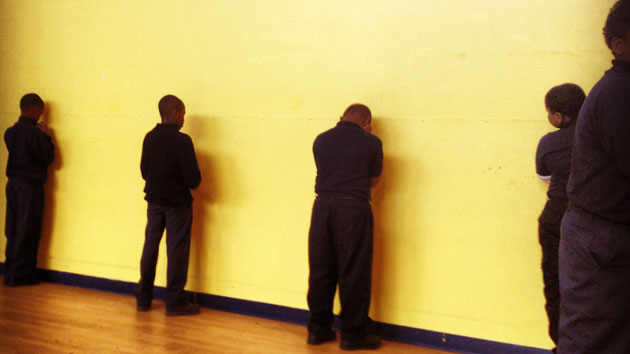
Update 7/17/15:
In 2000, George W. Bush took the stage at the NAACP’s annual convention and laid out, for the first time ever, an education policy overhaul he called No Child Left Behind. “Strong civil rights enforcement will be the cornerstone of my administration,” the Texas governor and presidential candidate announced to thunderous applause. “I will confront another form of bias: the soft bigotry of low expectations.”
Fifteen years later, NCLB is recognized less for its civil rights origins than for the era of high-stakes testing it ushered into American classrooms. Teachers have complained about having to teach to flawed and limited tests, and schools whose test scores have failed to meet the program’s test-based benchmarks have lost funding and in many cases have been closed or privatized.
After years of frustration with the program, Congress is weighing two bills to revamp it. And while the general consensus is that NCLB needs to change, the proposed measures are as politically thorny as the program itself. Both advocates of strong federal efforts to ensure education equality and opponents of a federally imposed testing regime have taken swipes at the legislation, raising the likely prospect that the reforms to NCLB won’t satisfy its defenders or its critics.
“If you believe that the federal government ought to take a stronger hand in [school curricula] or testing, you’re going to be disappointed,” says Peter Cookson, a program director at the American Institutes for Research and author of Class Rules: Exposing Inequality in America’s High Schools. “On the other hand, if you’re the kind of person who think the federal government has too much authority over local and regional state education, this is not a game changer.”
The House and Senate introduced parallel bills last week, both of which maintain the current testing schedule—students take federally mandated tests annually in grades three through eight and once in high school—and give states more agency over how to hold schools accountable. The two bills also limit the role of the education secretary, who currently grants waivers that release states from NCLB’s unrealistic test-score targets in exchange for meeting other requirements, thereby ending their obligation to tie teacher evaluations to test scores in order to receive federal education dollars.
The House’s Student Success Act, which passed last week by a narrow margin of 218-213, with 27 Republicans joining all Democrats in opposition, has little chance of becoming law as is. A provision known as portability, whereby federal funding for low-income districts follows poor students from school to school instead of remaining within the neediest districts, is a non-starter for Democrats who want to maintain funding for struggling schools. President Obama has said he won’t sign a bill that takes funds away from “poor kids and poor districts.”
The more moderate Senate bill, introduced by Sen. Lamar Alexander (R-Tenn.) and Sen. Patty Murray (D-Wash.) has broader support. “If you think the federal government should make sure that we’re not letting kids fall in the cracks, if you think the federal government should make sure there is transparency, if you think that the federal funds ought to continue to flow to support low income children, then the Senate bill does all of those things,” says Rick Hess, director of education policy studies at the conservative-leaning American Enterprise Institute.
But outside of conservative circles, much criticism of the Every Child Achieves Act remains. The goal of the overhaul is to mitigate the overreliance on testing while holding schools accountable, particularly for the education of minorities, students with disabilities, English language learners, and low-income students. The emerging consensus is that legislation falls short on both counts.
“This feels like a lost opportunity,” says Chad Aldeman of Bellweather Education Partners, a nonprofit education research and consulting firm. “The bill does not reduce testing, and while it does reduce the stakes of testing, it doesn’t direct states to develop new accountability systems.” Aldeman fears that with reduced federal oversight, “Many states will have a very loose, fluffy system in place, and that’s where I worry that disadvantaged students in particular will just get lost in the system—nobody is looking out for them.”
Julian Vasquez Heilig, a professor of education at California State University and critic of NCLB’s top-down, narrow testing regime, says the Senate bill merely takes the federal government out of the equation without putting something better in its place, such as a community-based approach to school reform. “One of the challenges of the current bill is that it just reduces the federal role,” he says. “It doesn’t change the paradigm. It doesn’t change the status quo.”
Civil rights advocates have split into two camps on NCLB—and both are critical of the proposed legislation. Some groups, such as the NAACP, worry that it will roll back important gains by undoing accountability measures tied to testing such as identifying low performing schools. Sen. Cory Booker (D-N.J.) echoed this concern last week when the bill was first presented. “We cannot now be damned by the self-defeating state of low expectations for ourselves and all of our children,” he said. “Kids who languish in this other America because of a lack of compassion and support and investment, they cannot now be seen to have less accountability for their success.” Booker and other Democrats presented a test-based accountability provision, which aimed to address this fear, however it failed during a vote on Wednesday.
The proposed measure had been opposed by the National Education Association as well as the second camp of civil rights groups who have argued that testing is not a form of accountability and has in fact placed an undue burden on minority students, who get bogged down in a disproportionate share of assessments. According to the Center for American Progress, urban high school students, who tend to be minorities, spend 266 percent more time on district-mandated exams than suburban students.
The Journey for Justice Alliance, a coalition of about 40 organizations who represent parents and students of color in 23 states, sent a letter last week to Senate Majority Leader Mitch McConnell and Minority Leader Harry Reid, urging them to move away from a reliance on tests. “Black and Latino families want world class public schools for our children, just as white and affluent families do,” the letter states. “We want quality and stability. We want a varied and rich curriculum in our schools. We don’t want them closed or privatized. We want to spend our days learning, creating and debating, not preparing for test after test.”
The Senate voted Wednesday to end debate on its bill but will continue hearing amendments and is expected to take a final vote by the end of the week. If it passes, the House and Senate bills will go to a conference committee, where a bipartisan team of legislators from both chambers will hash out the details of a final bill to send to President Obama for a signature. But the legislation’s perceived shortcomings could prevent it from making it that far: Education Secretary Arne Duncan told the New York Times there is a “40-60 chance” that the bill will make its way to the president’s desk.

















